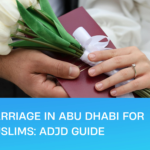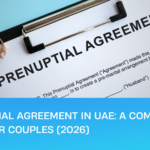Why a Power of Attorney is required for marriage in UAE?

✅ Quick Summary about POA for Marriage
- A Power of Attorney (POA) for Marriage lets the bride’s Wali appoint someone to represent him at the wedding.
- Required for Sharia marriages in Dubai if the Wali cannot attend in person.
- The appointed proxy must be of the same religion as the bride’s father.
- POA must be notarized in the UAE or legalized abroad with embassy and MOFA attestation.
- If issued in another language, it must be legally translated into Arabic.
- Ensures the marriage is valid and compliant with UAE Sharia law.
Marriage Requirements in the UAE
All expats, regardless of nationality and religion, can get married in the United Arab Emirates (UAE). Like in any country in the world, the UAE has specific requirements that the government requires to be eligible for marriage.
Types of Marriage in the UAE
In the UAE, some Emirates like Dubai and Abu Dhabi offer two types of Marriage: Sharia Marriage and Civil Marriage. Each type of marriage has its own legal requirements to be valid.
Sharia vs. Civil Marriage: Key Difference
- Civil Marriage is non-religious and is primarily intended for non-Muslim residents and tourists. It does not require the presence of the bride’s father or legal guardian.
- Sharia Marriage (also known as “Nikah”), on the other hand, requires the bride’s father/legal guardian (Wali) presence during the ceremony. If the bride’s father/legal guardian is not available to attend the wedding ceremony, he can appoint someone to act on his behalf via a Power of Attorney (POA) for Marriage Consent.
Such a proxy guardian must be of the same religion as that of the bride’s father, to complete marriage procedures using the POA for Marriage Consent.
👉 For a detailed breakdown of both options, see our guide on Civil vs. Sharia Marriage in Dubai
When a POA for Marriage is Needed in Sharia Marriage
A POA for Marriage Consent is required to formally authorize someone to represent the bride’s father or legal guardian (Wali) during the marriage ceremony, in cases where he cannot be physically present. This ensures that the Wali is fully aware of and consents to the marriage, even in his absence.
Legal Importance of a POA for Marriage in the UAE
Since the UAE follows Sharia Law, which recognizes the authority of the Wali in a woman’s marriage, his explicit consent is a legal requirement for a Sharia marriage to proceed. The UAE’s legal system is patriarchal in nature, and the Wali’s presence—or a POA issued by him—is essential for the marriage to be considered valid.
How to Notarize a POA for Marriage
A POA for Marriage Consent has to be notarized in one of the Notary Public offices.
- If the father is a UAE resident, he can notarize it locally through a notary public, such as Dubai Court.
- If the father is a non-UAE resident, the POA must be notarized in his home country, legalized by relevant authorities, and attested by the UAE Embassy.
- After embassy attestation, it must also be attested by the UAE Ministry of Foreign Affairs (MOFA).
- If the POA is in another language, it must be legally translated into Arabic before use in the UAE.
Get Professional Help for Your Marriage POA
To know more about the procedures of Sharia Marriage and/or how to obtain POA for Marriage Consent, contact us now.
📧 jessa@poa.ae | 📞 056 418 1931
Our legal experts can help you prepare, notarize, and attest your POA for Marriage—whether in the UAE or abroad—ensuring compliance with UAE marriage laws.
FAQs on POA for Marriage in the UAE
1. How to get married in Dubai?
Dubai offers two legal ways in getting married: Sharia Marriage (also known as “Nikah”) and Civil Marriage. Contact us to know the process, timeline and fees.
2. What is Sharia Marriage?
Sharia marriage (also known as “Nikāḥ”), is a legal and social contract in Islamic law between a man and a woman. It is based on mutual consent and outlines the rights and responsibilities of both spouses.
3. What are the requirements for Sharia Marriage?
To legally marry under Sharia Law in Dubai, couples must meet these essential requirements:
- Valid Emirates ID for both the bride and groom (if UAE residents).
- Valid passports copy for both the bride and groom.
- A premarital screening certificate from an approved UAE health facility.
- Physical presence of both the bride and groom during the ceremony.
- Presence of the bride’s father or guardian (Wali) and two male Muslim witnesses.
- If the bride’s father is deceased or unavailable, the next male guardian relative (e.g. brother, uncle, cousin) must be appointed via a Power of Attorney (POA).
- Divorced or widowed women must provide a Divorce Certificate (if divorced) or a Death Certificate of their late husband (if widowed). If these documents were issued outside the UAE, they must be fully attested and translated into Arabic.
- A No Objection Certificate (NOC) from her embassy or consulate is required if the bride is Muslim but her father is not.
4. How to get a POA for Marriage?
- A POA for marriage has to be notarized in one of the Notary Public offices.
- If the father is a UAE resident, he can notarize it in the UAE through a notary public in Dubai Court.
- If the father of the bride is a non-UAE resident, then he has to notarize the Power of Attorney outside the UAE, then the POA must be legalized in the relevant authorities and the UAE Embassy in that country, followed by attestation from the UAE Ministry of Foreign Affairs (MOFA).
- If it’s in another language, it must be legally translated into Arabic.
Disclaimer: The content on this page is for general information purposes only and does not constitute as legal advice nor should it be used as a basis for any specific action or decision. Nothing on this page or website is to be considered as rendering of legal advice or legal services for any specific matter. Users of this website are advised to seek specific legal advice by contacting a lawyer regarding any specific legal issues.





